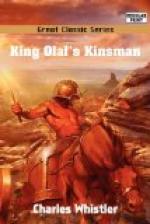But I who knew him almost from the first have seen how he hated these deeds, staying the hands of his chiefs as soon as he knew what his power was. Therein wrought Emma the queen, whose pride taught him what his place was, sooner than might else have been.
Now I will say one last word of myself, who am happy—in wife, and children, and home. Cnut made me ealdorman, that so I might serve East Anglia, and I am glad, for I must needs go to the great witan at times and meet Godwine and Relf and many others who are my friends. But, rather than Redwald the ealdorman, I would that I might be called ever by the name which comes into the songs of Ottar the scald now and then—the name in which I have most pride, King Olaf’s kinsman.
The end.
Notes.
1 the armed followers of a Saxon noble.
2 The national weapon. A short, strong, curved blade used as a dirk.
3 The massacre of the Danes on St. Brice’s day,
10O2 A.D., in
which Swein’s sister was killed.
4 Now Peterborough.
5 From the Heimskringla, Saga of Olaf the Saint.
6 Tribute.
7 An embodied familiar spirit.
8 According to Bede, in A.D. 418 the Romans collected
and hid
all the treasure in England, except some
part which they
took to Gaul. OElla took Anderida
in 491 A.D.
9 The cold spring.
10 Mail shirt.
11 Daughter of Alfred the Great, and wife of Ethelred,
Earl of
Mercia.
12 The utmost term of Saxon contempt.
13 Now Canewdon.
14 The “Five Boroughs” of the old Danelagh
were Leicester,
Lincoln, Nottingham, Stamford, and
Derby.
15 The work of the great Dunstan, and the first code
that
recognized the rights of Danish
settlers.
16 This prophecy of Olaf’s is recorded in the
“Saga of Olaf the
Saint”.



